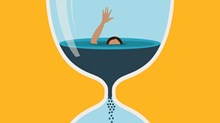"But Why?"
Q. Our 11-year-old is becoming very stubborn and challenging everything we say. It's as though she has to question every decision and every request we make of her. What's going on?
A. Your daughter is going through a very normal, but very frustrating stage of development. Her mind is learning to deal with information in a whole new way, moving from simply accepting what she hears to actually filtering it through her expanding understanding of the world. That means the process of how she's learning about life and faith is at least as important as the content of what she's learning.
This is an important change for parents to understand, especially with the emphasis on test scores so prevalent in the school culture. Even Christian schools, who are rarely involved in state testing, tend to focus on cramming in content with an eye to college acceptance.
Many churches take a similar approach, loading preteens and young teens with information and Bible facts in hopes that these truths will "stick" and become a guiding force in their lives.
But the preteen brain is ready for so much more. Just prior to puberty, your child's brain does a wonderful thing: it grows an abundance of new connections. Like a massive infiltration of tree roots grasping for earth, these new connections between various parts of the brain open up a world of possibilities.
However, these new connections are only that: possibilities. There is no good way to use them all. The most-used connections form a dominant part of the brain's function through the rest of life. Those connections that are used less, well, they'll always be used less.
That's why it's essential to take advantage of your preteen's sometimes-annoying tendency to question everything. Talking her through your decision-making process will help her develop her own discernment abilities. When she asks why you won't let her see a certain movie or stay out past 9, talk her through your reasoning. When she tries to push her limits by asking "what if" questions, guide her through the process of making a good decision.
Yes, this stage takes tremendous patience, but in showing your child how to take in information and mill it around as she makes decisions, you are giving her an invaluable gift. Exercising this part of her developing brain will have a positive impact on her spiritual growth, her emotional health, her relational maturity, and her desire to continue growing and learning for the rest of her life.
So, make room for speculation. Encourage discovery. Don't be threatened by questioned values and boundary-pushing. This is the best stuff of early-adolescent brain development!
Mark Oestreicher is the president of Youth Specialties (YouthSpecialties.com), the leading provider of resources and training for Christian youth workers.
Not Much Just Chillin': The Hidden Lives of Middle Schoolers, by Linda Perlstein (Farrar, Straus and Giroux)
I think this is the most significant book about preteens written in a decadeand I've read them all. Linda Perlstein, an education editor for The Washington Post, took a year off her day job and weaved her way into the lives, homes, and classrooms of average kids at Wilde Lake Middle School in Columbia, Maryland. Perlstein writes as a journalist, but fills the book with research and stories offering a wonderful extended glimpse into the real lives of preteens. Every parent of a current or future middle school student needs to read this book.
-MO
Copyright © 2004 Christianity Today. Click for reprint information.
Read more articles that highlight writing by Christian women at ChristianityToday.com/Women
 Read These Next
Read These Next
 Family Time with God: AprilDaily faith builders for the whole gang
Family Time with God: AprilDaily faith builders for the whole gang Married . . . with ParentsWhen homesickness tugs at your heart
Married . . . with ParentsWhen homesickness tugs at your heart
 Crazy-Busy ChristiansGetting down to the reality of what Jesus actually calls us to do
Crazy-Busy ChristiansGetting down to the reality of what Jesus actually calls us to do








 Homepage
Homepage